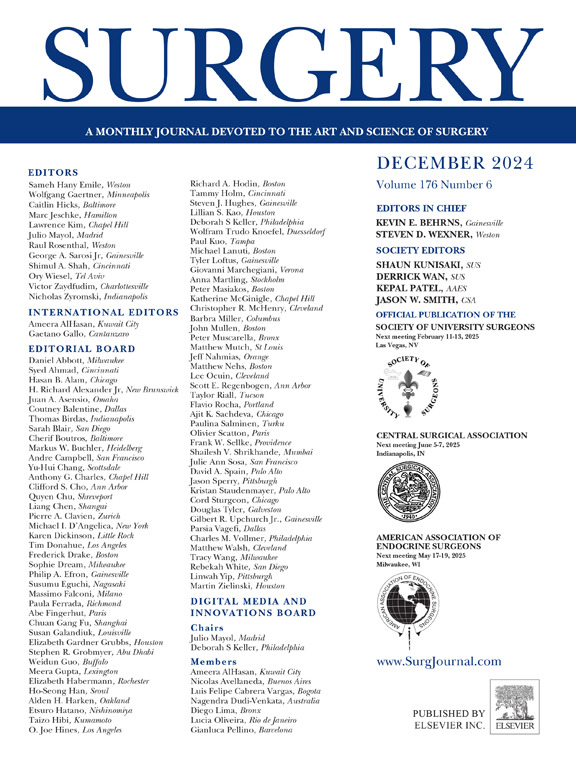Association of perioperative immunonutrition with anastomotic leak among patients undergoing elective colorectal surgery within a robust enhanced recovery after surgery program
IF 3.2
2区 医学
Q1 SURGERY
引用次数: 0
Abstract
Background
Immunonutrition supplementation has been shown to reduce the risk of surgical infectious complications; however, its effect on decreasing anastomotic leak rates, in the context of an otherwise robust Enhanced Recovery After Surgery (ERAS) program, remains unclear. This study aims to assess the association between perioperative immunonutrition supplementation and anastomotic leak in an elective Enhanced Recovery After Surgery colorectal surgical population.
Methods
We performed a retrospective single-institution cohort study consisting of adult patients enrolled in an Enhanced Recovery After Surgery pathway and undergoing elective colorectal surgery from 2018 to 2023. Immunonutrition supplementation was defined as a 10-day perioperative supply of commercially available nutritional shakes. Relevant demographic covariates, preoperative characteristics, and operative methods were identified and analyzed. Multivariable logistic regression was performed to determine the association of immunonutrition with anastomotic leak.
Results
A total of 708 patients were included in the study, of which n = 400 (56.5%) received perioperative immunonutrition. Patients who received immunonutrition were more likely to be older (median age 57.9 vs 55.7), male (52.7% vs 44.8%), have a higher body mass index (27.7 vs 26.3), and less likely to be current smokers (9.8% vs 16.2%). On adjusted analysis, there was no association between immunonutrition use and anastomotic leak (odds ratio = 0.96, 95% confidence interval = 0.45, 2.08), 30-day readmission (odds ratio = 0.97, 95% confidence interval = 0.60, 1.57), or length of stay (β = .40, 95% confidence interval = –0.06, 0.86)
Conclusion
We did not observe an association between perioperative immunonutrition supplementation and postoperative anastomotic leak, suggesting that the role of immunonutrition within a comprehensive Enhanced Recovery After Surgery program for elective colorectal surgery may warrant further evaluation.
求助全文
约1分钟内获得全文
求助全文
来源期刊

Surgery
医学-外科
CiteScore
5.40
自引率
5.30%
发文量
687
审稿时长
64 days
期刊介绍:
For 66 years, Surgery has published practical, authoritative information about procedures, clinical advances, and major trends shaping general surgery. Each issue features original scientific contributions and clinical reports. Peer-reviewed articles cover topics in oncology, trauma, gastrointestinal, vascular, and transplantation surgery. The journal also publishes papers from the meetings of its sponsoring societies, the Society of University Surgeons, the Central Surgical Association, and the American Association of Endocrine Surgeons.
 求助内容:
求助内容: 应助结果提醒方式:
应助结果提醒方式:


